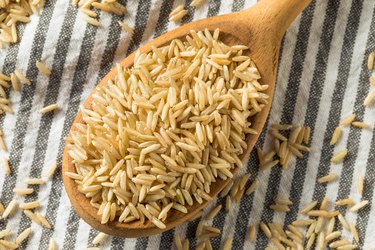
According to the United States Department of Agriculture, at least one-half of all the grains you eat should be whole grains, such as long-grain brown rice. These rices retain the germ and bran.
White rice does not have the germ and the bran because they are removed during its milling process. Brown rice is a great source of many nutrients, such as fiber, minerals and many important vitamins like folate, niacin, riboflavin and thiamin. There are also lots of delicious brown rice recipes you can try if you learn how to cook long-grain brown rice.
Video of the Day
Video of the Day
Rinse the Rice
The ideal brown rice to water ratio should be about 2 and a half parts water per single part long-grain brown rice. However, according to Martha Stewart, if you want your rice to cook up fluffy and separated, you should add slightly less water than what is recommended.
The first step is to thoroughly rinse the brown rice. For this, you will need a strainer or a colander with small holes, so the rice doesn't fall through. Place the rice in the strainer and rinse under cool running water for a few minutes, allowing the excess water to drain away when you're done.
It is very important that you don't skip this step. Brown rice may contain high levels of arsenic, which can be greatly reduced by rinsing, according to a March 2016 report published by the FDA, entitled Arsenic in Rice and Rice Products Risk Assessment Report. The arsenic content can be reduced by up to 30%, simply by rinsing.
Cover in Water
After the rinsing is done, put the rice in a saucepan and add the water. If you want to further reduce the levels of arsenic beyond what you had removed with the rinsing process, you could add even more water to the rice.
A brown rice-to-water ratio of about 6 parts water for 1 part long-grain brown rice should reduce the arsenic to negligible levels. The trade-off is that you will lose most of the nutrients as well.
While we're still talking about the ideal brown rice-to-water ratio, it is worth mentioning that you also don't just have to use water for this step. You could add coconut milk, or some other liquid, for some of the water, or even all of it. In fact, different liquids will give your rice different flavors.
Once you've added the water, add a large pinch of salt. Then stir the mixture, and proceed to the next step.
Boil the Rice
Place the saucepan with the rice and liquid in it on your stove, put the heat on high, and bring the water to a boil with the rice in it. Once it's boiling, stir the rice gently and briefly, and then lower the temperature to a low-to-medium setting so that the whole mixture is gently simmering. Put the lid of the pan in place, and let the long-grain brown rice simmer for a while.
Give the rice time to cook and absorb all of the water or liquid you added. The ideal time to allow the rice and water to simmer should be about 45 minutes.
You can use a timer to let you know when the time has elapsed, but do check it in 5 to 10 minute increments to stir the mixture. If the rice fully absorbs the liquid before the cooking time is up, add slightly more water so it can continue cooking until the rice is ready.
Let the Rice Stand
After 45 minutes are up and the rice has absorbed all of the liquid, remove the pan from the heat and let it just stand. The lid should remain in place during this period. Give it about 5 minutes to stand untouched, so that any extra moisture either evaporates away or is absorbed by the rice. Once the 5 minutes are up, gently fluff the rice with a fork.
From here, you can either serve the rice or use it as you wish in any brown rice recipes. If you want to make it into a side dish, you can mix in some sautéed garlic and onions, grated cheese or minced fresh herbs.
If you want the brown rice in a recipe that requires white rice, parboil the brown rice for about 15 minutes and then drain it. After that, you can use it just as you would use white rice, even though it's not in typical brown rice recipes.